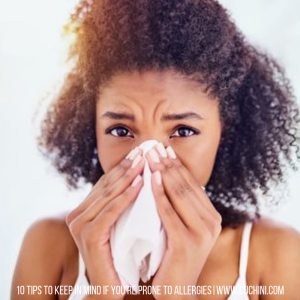 Do you often wake up with itchy eyes and a runny nose? If you suffer from rashes, frequent sneezing fits, and puffy eyes, chances are, you’re exposed to allergens. From dusty shelves to blankets you haven’t washed in a month—there are items around the house that can trigger an allergic reaction. It’s not enough that you dust only when you feel like it or that you sweep the floors weekly—you need to allot time for deep cleaning sessions. To help you avoid allergies and its symptoms, here are must-dos to keep in mind:
Do you often wake up with itchy eyes and a runny nose? If you suffer from rashes, frequent sneezing fits, and puffy eyes, chances are, you’re exposed to allergens. From dusty shelves to blankets you haven’t washed in a month—there are items around the house that can trigger an allergic reaction. It’s not enough that you dust only when you feel like it or that you sweep the floors weekly—you need to allot time for deep cleaning sessions. To help you avoid allergies and its symptoms, here are must-dos to keep in mind:
#1 Choose your cleaning products wisely
According to research, there are cleaning products that contain harsh chemicals like formaldehyde and ammonia that are bad for one’s health. Use non-toxic cleaning products like baking soda and white vinegar as these are powerful cleaners that can be used in different concentrations. To get started, you can mix vinegar and salt to create a surface cleaner or sprinkle baking soda on carpets to get rid of stains and funky odors.
#2 Dusting is key
A tiny speck of dust can trigger allergies in a snap. Shelves, tables, nooks, crannies, and any other surface must be dusted thoroughly. Wear a face mask while cleaning to avoid inhaling particles and allergens.
#3 Declutter
You’ve heard it a thousand times before—edit your belongings, declutter, and get rid of items you no longer need. Boxes or bags of old clothes can gather dust and immediately turn into a home for pests. Avoid a dark and dusty storage room by regularly checking for items you can donate or discard completely.
#4 Change your bedding and pillowcases weekly
Our bed and pillows are the favorite breeding grounds of dust mites. This is one of the possible reasons why you often waking up sneezing and with puffy eyes. To keep this from happening, make it a habit to change your bedding and pillow covers weekly. Wash these essentials using hot water (at least 130 degrees Fahrenheit) and let it dry completely before storing inside the cabinet.

#5 Change your filters regularly
Filters found in air-conditioners and dehumidifiers collect dust and must be replaced as well. If the filter is ignored, allergens can build up and eventually circulate throughout the house. Schedule the replacement and leave a note on your family calendar so you won’t forget.
#6 Vacuum your carpets and rugs
Dust can easily get trapped in between the fibers of your rugs and carpets. We’re sure that if you roll it up, dust bunnies will greet you, too! Using a vacuum cleaner with HEPA filter, vacuum the carpet and the floor to get rid of dust and allergens. Depending on the material of your area rugs, make sure you wash these regularly, too.
#7 Wash your curtains
As much as possible, opt for cotton or synthetic fabric curtains to make washing easier. Make sure you replace your curtains every two weeks. If your house is located near a busy street, you might have to do it weekly.
#8 Clean your furniture
Wooden, leather, and upholstered pieces can gather dust, too. Depending on the type of furniture you have at home, clean these pieces on a weekly basis to get rid of dust. A damp microfiber cloth will do to preserve the finishes of your furniture.
#9 Wipe down your light switches
Imagine the number of hands that touch the switches on a daily basis—germs and bacteria can be passed around so easily! Disinfect this overlooked part of the home by giving it a good wipe down using antibacterial wipes. As an alternative, you can also use a cloth and an antibacterial multipurpose cleaner.
#10 Look after your pets
If you share the home with a furry friend, it’s best that you give him a good bath weekly. Since some pets shed a lot of hair, it’s best to sweep hairballs immediately to keep these from spreading around the house. Remember, they find their way into fans and filters as well.
 Did you enjoy this article?
Did you enjoy this article?






